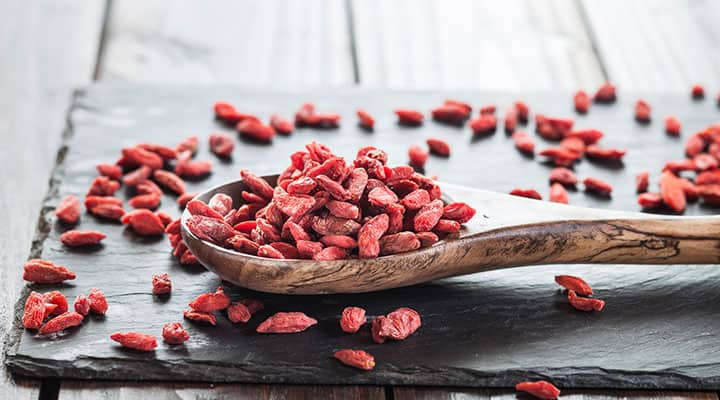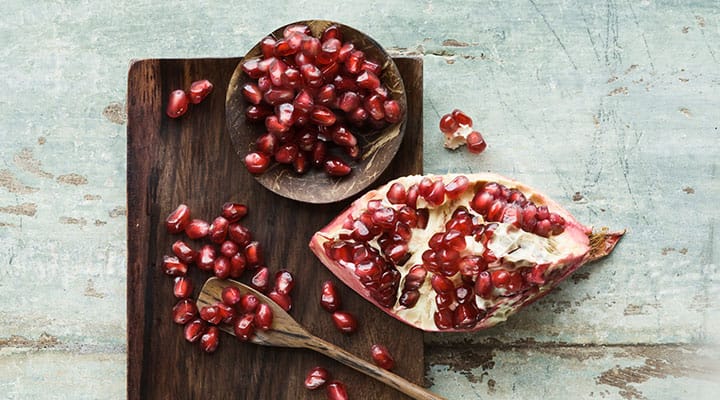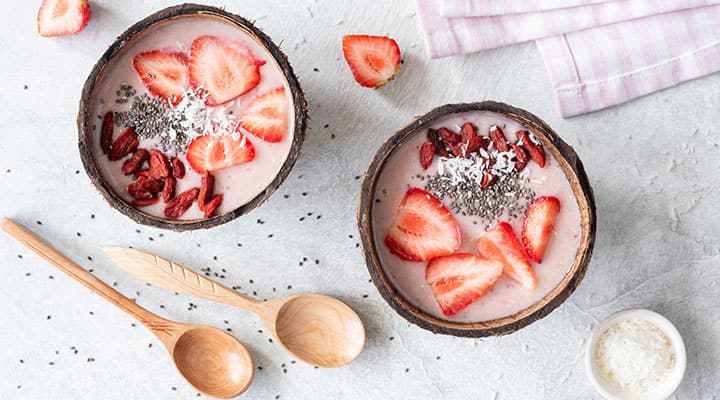
13 Healthy Berries
Published: March 2024
From a blueberry's familiar burst of tangy flavor to more exotic fare like the goji berry, these fabulously flavorful fruits offer a unique blend of fiber, vitamins, minerals, antioxidants and phytonutrients. Let's find out which berries are healthiest and review the science-backed reasons why incorporating these nutrient-dense fruits into your diet can help support overall health.
But before we get too far into our ranking, let's be clear about one thing: of all types of berries, there are no unhealthy options! While the nutrient profile of each type of berry will vary slightly, the "healthiest" berry is the one you enjoy most and are most likely to eat consistently.
Why are berries so healthy?
A berry's rich color isn't just eye candy: it's also the source of the fruit's nutrients. Each color equates to specific nutrients; for example, anthocyanins appear as dark blue hues and berries that are a deep red often contain flavonoids and resveratrol.
But the benefits don't end there. When you choose berries in their whole form, either fresh, frozen, or canned, you'll get a boost of fiber too. Frozen berries are just as nutritious and often more affordable and versatile in recipes like smoothies. Aside from eating the fruit raw, you can also enjoy many health benefits from berry extracts, powders and capsules.
However, it's important to be cautious of berry juice, which contains high levels of sugar, similar to other fruit juices. If you can find unsweetened berry juice without added sugar, the recommended intake is four to eight ounces per day, a few days per week, while following a low-refined sugar diet. (It's worth noting that jams, jellies, pies, or ice creams, while delicious, do not constitute adequate fruit consumption in a health-conscious diet.)
13 Healthy Berries
So which berries pack the most punch when it comes to nutrition? Here are 13 nutritious options that are as nutritious as they are colorful and flavorful!
1. Blueberries
Blueberries are considered one of the healthiest berries due to their concentration of antioxidants, notably anthocyanins, which contributes to their deep blue hue and health benefits. These antioxidants reduce oxidative stress, bolstering the body's defense systems. Blueberries boast an impressive array of vitamins and minerals, like vitamin C, small levels of vitamin K, and manganese. Their low calorie, high fiber content makes them a weight loss friendly snack while promoting digestive health. Last but certainly not least, they may support cognitive function, making them "berry" good for your brain!
2. Strawberries
Originally cultivated in ancient Rome, strawberries are now the most popular berry worldwide—and they're super nutritious. Just eight medium-sized strawberries provide 96 milligrams of vitamin C, exceeding the recommended daily intake by 160%, surpassing the vitamin C content of a medium orange. Strawberries also offer a good dose of folate, delivering 20% of the recommended daily allowance.
These summer berries pack a punch of cardiovascular-supporting potassium, which can help maintain healthy blood pressure and other cardiovascular metrics. Rich in polyphenols like anthocyanins, flavan-3-ol, and ellagitannin, strawberries have an impressive antioxidant profile. Notably, they are the richest food source of fisetin, a polyphenol nutrient revered for its healthy aging properties.
3. Raspberries
Raspberries are packed with polyphenol antioxidants like anthocyanins and ellagic acid, and they have been shown to reduce oxidative stress and promote a healthy inflammatory response. A cup of raspberries provides an impressive 54% of the recommended daily intake of vitamin C, supporting the immune system and promoting skin health.
With a supremely high fiber content of 9 g per cup serving, raspberries aid in digestion, help maintain healthy blood sugar levels, and promote heart health. Notably, their low glycemic index makes them a suitable choice for individuals seeking weight management or maintaining healthy blood sugar levels. Raspberries also contain flavonoids such as quercetin and kaempferol, which contribute to their cardiovascular benefits and support of a health inflammatory response.
4. Cranberries
The benefits of cranberries extend far beyond urinary tract health, although their utility in this area is well documented. Cranberries contain compounds that help maintain a healthy urinary tract and stomach, as well as oral and periodontal health. Rich in polyphenolics, cranberries boast deep red anthocyanins known for their antioxidant properties. Additionally, oligomeric proanthocyanidins (PACs) found in cranberries lend to benefiting our health. Keep in mind that fresh and dried cranberries themselves are quite tart and most palatable-tasting cranberry food products are full of added sugars. Taking a cranberry supplement allows you to harness the benefits of cranberries without taking in the added sugars.
5. Maqui berries
You won't find maqui berries in the produce section of the grocery store outside of South America where they are grown, but you will find them available in the supplement section in powder and capsule form. Bursting with antioxidants, particularly anthocyanins, the maqui berry contains compounds called delphinidins, which support the eye's natural defenses and promote the production of your own natural tears. Supplementing with an Aristotelia chilensis maqui berry extract in the morning can help support eye health, comfort and lubrication all day long.
Berry Surprising Facts About Bananas
Did you know that bananas are berries? Not only that, raspberries are not berries! Botanically speaking, that is. Turns out, there are what is known as "common berries" like blackberries and raspberries, and then there are "botany berries" like bananas, cucumbers, and even pumpkins!
Explore Our Best Heart Health Supplements
6. Goji berries
You may have seen this reddish-pink berry in the dried fruit section or specialty markets, or perhaps you've never heard of this oval-shaped superfruit. The goji berry thrives in the arid regions of northwest China, and it is in the same family as tomatoes (fresh goji berries look a bit like grape tomatoes), potatoes and eggplants. Brimming with antioxidants, vitamins and minerals, goji berries may offer a plethora of health benefits, including immune support, helping maintain cardiovascular health and healthy aging properties. You might consider incorporating goji berries as a topping on yogurt or oatmeal, in a homemade trail mix or on their own as a snack.
7. Acai berries
These celebrated Brazilian berries are the star ingredients in smoothie bowls in trendy cafes worldwide. Native to the rainforests of the Amazon region, the acai berry has garnered worldwide acclaim for its antioxidant profile, boasting high levels of anthocyanins and flavonoids. However, the amount of research on acai is limited compared to other fruits on this list such as blueberries, strawberries and cranberries.
8. Bilberries
Bilberries, a type of blueberry, are richly concentrated in anthocyanins, flavonoids and antioxidants, which contributes to their deep purple coloring and health-promoting properties. These nutrients might support eye health, and alleviate eye strain. Their antioxidant properties may help reduce oxidative stress and help support a healthy inflammatory response. One cup of bilberries will impressively provide 7 g of fiber, which might support your gut health to boot.
9. Elderberries
Elderberries contain a rich amount of antioxidants, like anthocyanins and flavonoids, which contribute to their purple-black hue and their health-promoting compounds. Widely utilized for their immune-supporting properties, they may be useful in maintaining respiratory health. With their impressive concentration of vitamins, minerals and phytonutrients, elderberries are often repurposed into tinctures, jams, syrups and teas.
10. Pomegranates
A little-known fact is that the pomegranate is actually a berry! Bursting with antioxidants, particularly punicalagins and anthocyanins, pomegranates help our body fight oxidative stress while supporting a healthy inflammatory response and cellular health. Recognized for its heart-healthy effects, most of the research has used pomegranate juice and found benefits to blood pressure, cholesterol levels, and overall cardiovascular health. Look for juices made with no added sugar and limit to four to eight ounces per day depending on your health goals. Pomegranates serve as a versatile and delicious addition to salads, smoothies and desserts.
11. Mulberries
Mulberries are chock-full of antioxidants, including resveratrol, flavonoids and anthocyanins, which contribute to their vibrant color and robust health benefits. Mulberries may be a valuable ally in maintaining healthy blood sugar levels and promoting metabolic health. Mulberries are not easy to preserve due to their water content, so choosing them fresh, frozen or in supplement form is likely the best option for consumption.
12. Blackberries
Blackberries contain minerals, dietary fiber, anthocyanins, flavonoids and are a source of vitamin C. These dark-hued berries help reduce oxidative stress, support cognitive function and heart health, blackberries are a delicious ally in maintaining optimal health and vitality.
13. Blackcurrants
Blackcurrants are brimming with nutrition from antioxidants, particularly anthocyanins, flavonoids and vitamin C, which contribute to their purple hue and health benefits. Blackcurrants may support a healthy inflammatory response and circulation. Blackcurrants often are served as a delicious addition to various culinary creations, including jams, sauces and desserts. Be conscious of the added sugars in these foods when consuming recipes made with blackcurrants.
Is it good to eat berries every day?
Yes, it is generally beneficial to eat berries every day as part of a balanced diet. Berries are rich in vitamins, minerals, fiber and antioxidants, which contribute to our overall health. Regular consumption of berries has been associated with numerous health benefits, including heart health, maintaining a healthy inflammatory response, better cognitive function and healthy cellular function.
Berries offer a wealth of nutritional benefits due to their rich content of vitamins, minerals, fiber, antioxidants, and being low in total calories. Some key nutritional benefits of berries include:
Antioxidants:
Berries are packed with antioxidants such as anthocyanins, flavonoids, resveratrol, and polyphenols, which help neutralize free radicals in the body, fight oxidative stress and support a healthy inflammatory response.Vitamins and minerals:
Berries are excellent sources of vitamin C, as well as manganese and other essential minerals. These nutrients play crucial roles in immune health, bone health and collagen production.Dietary fiber:
Berries are high in dietary fiber, which aids digestion, promotes regular bowel movements, and helps maintain healthy blood sugar and cholesterol levels.Low in calories:
Most berries are low in calories, making them a healthy choice for weight management and blood sugar.Heart health:
The antioxidants and fiber found in berries contribute to heart health by helping maintain healthy blood pressure and cholesterol levels.Brain health:
Some studies suggest that the antioxidants in berries may help protect brain cells from oxidative stress, potentially reducing the risk of age-related cognitive decline and supporting memory and cognitive function.
About the Author: With over 10 years of experience in nutrition, Caroline Thomason is a media dietitian in the greater Washington, DC area. As a dietitian, she is the best at breaking down science-based information in an easy-to-digest way for consumers and healthcare professionals alike. In her private practice, she works with women who want to stop dieting and find confidence with food.
References
- Bahari H, et al. "The effects of pomegranate consumption on blood pressure in adults: A systematic review and meta-analysis." Phytother Res. February 2024. https://pubmed.ncbi.nlm.nih.gov/38410857/
- Grynkiewicz G, Demchuk OM. "New Perspectives for Fisetin." Frontiers in Chemistry. October 2019. https://www.frontiersin.org/articles/10.3389/fchem.2019.00697/full
- Jan B, et al. "Nutritional constituents of mulberry and their potential applications in food and pharmaceuticals: A review." Saudi J Biol Sci. July 2021. https://www.ncbi.nlm.nih.gov/pmc/articles/PMC8241616/
- Jiao Y, Liu G. "Goji Berry—A Novel Nutraceutical "Superfruit" for Florida Master Gardeners." University of Florida. October 2020. https://edis.ifas.ufl.edu/publication/HS1391
- Kalt W, et al. "Recent Research on the Health Benefits of Blueberries and Their Anthocyanins." Adv Nutr. March 2020. https://www.ncbi.nlm.nih.gov/pmc/articles/PMC7442370/
- Koyama R, et al. "Pre- and Post-Harvest Conditions Affect Polyphenol Content in Strawberry (Fragaria × ananassa)." Plants (Basel). August 2022. https://www.ncbi.nlm.nih.gov/pmc/articles/PMC9460031/
- Ma ZF, et al. "Goji Berries as a Potential Natural Antioxidant Medicine: An Insight into Their Molecular Mechanisms of Action." Oxid Med Cell Longev. January 2019. https://www.ncbi.nlm.nih.gov/pmc/articles/PMC6343173/
- McVean A, Lee C. "Bananas are Berries. Raspberries are Not." McGill. December 2017. https://www.mcgill.ca/oss/article/did-you-know/bananas-are-berries-raspberries-are-not
- Ozawa Y, et al. "Bilberry extract supplementation for preventing eye fatigue in video display terminal workers." J Nutr Health Aging. May 2015. https://pubmed.ncbi.nlm.nih.gov/25923485/
- Wing-kwan C, et al. Herbal Medicine: Biomolecular and Clinical Aspects. 2nd edition. National Library of Medicine. 2011. https://www.ncbi.nlm.nih.gov/books/NBK92770/
- Yan L. "Blueberries and Health." U.S. Department of Agriculture. September 2023. https://www.ars.usda.gov/plains-area/gfnd/gfhnrc/docs/news-articles/2014/blueberries-and-health/
- "Acai." National Center for Complementary and Integrative Health. August 2020. https://www.nccih.nih.gov/health/acai
- "California Elderberries." University of California. https://ucanr.edu/sites/Elderberry/health/
- "Cranberries and Health." University of Massachusetts. https://www.umassd.edu/chrc/cranberries-and-health/
- "Red Raspberries." Data on file.
- "Strawberries – Early Summer Fruit." University of Arkansas. https://www.uaex.uada.edu/counties/miller/news/fcs/fruits-veggies/Strawberries-Early%20Summer%20Fruit.aspx
Like what you read?
Please subscribe to get email updates on this blog.












